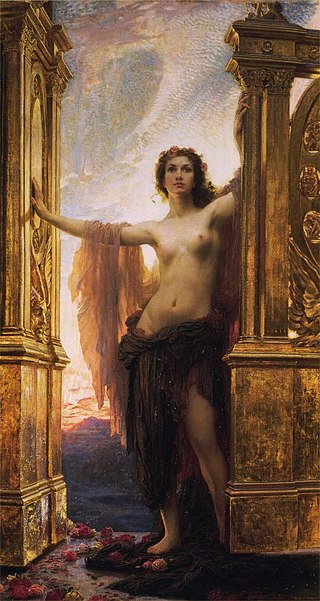
In ancient Greek mythology and religion, Eos is the goddess and personification of the dawn, who rose each morning from her home at the edge of the river Oceanus to deliver light and disperse the night. In Greek tradition and poetry, she is characterized as a goddess with a great sexual appetite, who took numerous lovers for her own satisfaction and bore them several children. Like her Roman counterpart Aurora and Rigvedic Ushas, Eos continues the name of an earlier Indo-European dawn goddess, Hausos. Eos, or her earlier Proto-Indo-European (PIE) ancestor, also shares several elements with the love goddess Aphrodite, perhaps signifying Eos's influence on her or otherwise a common origin for the two goddesses. In surviving tradition, Aphrodite is the culprit behind Eos' numerous love affairs, having cursed the goddess with insatiable lust for mortal men.
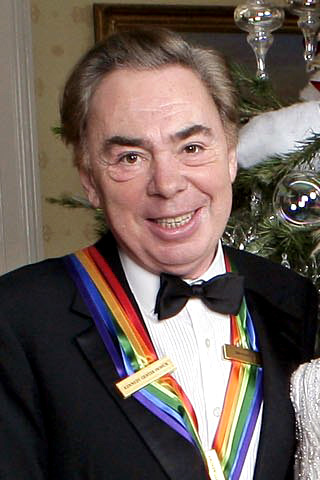
Andrew Lloyd Webber, Baron Lloyd-Webber is an English composer and impresario of musical theatre. Several of his musicals have run for more than a decade both in the West End and on Broadway. He has composed 21 musicals, a song cycle, a set of variations, two film scores, and a Latin Requiem Mass.

Astraea, Astrea, Astria or Austräa, in ancient Greek religion, is a daughter of Astraeus and Eos. She is the virgin goddess of justice, innocence, purity and precision. She is closely associated with the Greek goddess of justice, Dike. She is not to be confused with Asteria, the goddess of the stars and the daughter of Coeus and Phoebe. The main belt asteroid 5 Astraea is named after her, and her name was also suggested for the planet Uranus.
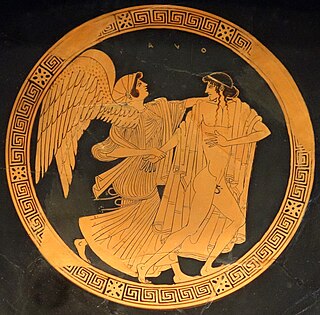
In Greek mythology, Tithonus was the lover of Eos, Goddess of the Dawn. He was a prince of Troy, the son of King Laomedon by the Naiad Strymo (Στρυμώ). The mythology reflected by the fifth-century vase-painters of Athens envisaged Tithonus as a rhapsode, as attested by the lyre in his hand, on an oinochoe of the Achilles Painter, circa 470–460 BC.
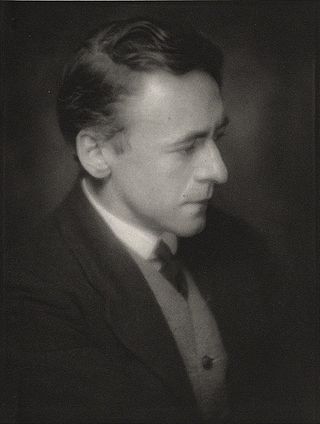
Sir Arnold Edward Trevor Bax was an English composer, poet, and author. His prolific output includes songs, choral music, chamber pieces, and solo piano works, but he is best known for his orchestral music. In addition to a series of symphonic poems, he wrote seven symphonies and was for a time widely regarded as the leading British symphonist.
A symphonic poem or tone poem is a piece of orchestral music, usually in a single continuous movement, which illustrates or evokes the content of a poem, short story, novel, painting, landscape, or other (non-musical) source. The German term Tondichtung appears to have been first used by the composer Carl Loewe in 1828. The Hungarian composer Franz Liszt first applied the term Symphonische Dichtung to his 13 works in this vein, which commenced in 1848.
William Southcombe Lloyd Webber was an English organist and composer, who achieved some fame as a part of the modern classical music movement whilst commercially facing mixed opportunities. Besides his long and prestigious career, composing works ranging from choral pieces to instrumental items and more, he is known for being the father of both fellow composer Andrew Lloyd Webber and virtuoso cellist Julian Lloyd Webber. He also notably served as a teacher, instructing pupils on music theory at the Royal College of Music for many years until his death in 1982.
Program music or programmatic music is a type of instrumental art music that attempts to musically render an extramusical narrative. The narrative itself might be offered to the audience through the piece's title, or in the form of program notes, inviting imaginative correlations with the music. A well-known example is Sergei Prokofiev's Peter and the Wolf.

Zorya is a figure in Slavic folklore, a feminine personification of dawn, possibly goddess. Depending on tradition, she may appear as a singular entity, often called "The Red Maiden", or two or three sisters at once. Although Zorya is etymologically unrelated to the Proto-Indo-European goddess of the dawn *H₂éwsōs, she shares most of her characteristics. She is often depicted as the sister of the Sun, the Moon, and Danica, the Morning Star with which she is sometimes identified. She lives in the Palace of the Sun, opens the gate for him in the morning so that he can set off on a journey through the sky, guards his white horses, she is also described as a virgin. In the Eastern Slavic tradition of zagovory she represents the supreme power that a practitioner appeals to.

Night on Bald Mountain, also known as Night on the Bare Mountain, is a series of compositions by Modest Mussorgsky (1839–1881). Inspired by Russian literary works and legend, Mussorgsky composed a "musical picture", St. John's Eve on Bald Mountain on the theme of a Witches' Sabbath occurring at Bald Mountain on St. John's Eve, which he completed on that very night, 23 June 1867. Together with Nikolai Rimsky-Korsakov's Sadko (1867), it is one of the first tone poems by a Russian composer.

Venus and Adonis is a narrative poem by William Shakespeare published in 1593. It is probably Shakespeare's first publication.

Aurōra is the Latin word for dawn, and the goddess of dawn in Roman mythology and Latin poetry. Like Greek Eos and Rigvedic Ushas, Aurōra continues the name of an earlier Indo-European dawn goddess, Hausos.
"Memory" is a show tune composed by Andrew Lloyd Webber, with lyrics by Trevor Nunn based on poems by T. S. Eliot. It was written for the 1981 musical Cats, where it is sung primarily by the character Grizabella as a melancholic remembrance of her glamorous past and as a plea for acceptance. "Memory" is the climax of the musical and by far its best-known song, having achieved mainstream success outside of the musical. According to musicologist Jessica Sternfeld, writing in 2006, it is "by some estimations the most successful song ever from a musical."

Also sprach Zarathustra, Op. 30 is a tone poem by Richard Strauss, composed in 1896 and inspired by Friedrich Nietzsche's philosophical 1883–1885 novel Thus Spoke Zarathustra. Strauss conducted its first performance on 27 November 1896 in Frankfurt. A typical performance lasts roughly thirty-three minutes.
Fountains of Rome, P 106, is a tone poem in four movements completed in 1916 by the Italian composer Ottorino Respighi. It is the first of his three tone poems about Rome, preceding Pines of Rome (1924) and Roman Festivals (1928). Each movement depicts a setting at one of Rome's fountains at a different time of the day, specifically the Valle Giulia, Triton, Trevi, and Villa Medici. The premiere was held at the Teatro Augusteo on 11 March 1917, with Antonio Guarnieri conducting the Augusteo Orchestra. Respighi was disheartened at its initial mild reception and put away the score, until the piece was re-evaluated by the public following a February 1918 performance by conductor Arturo Toscanini which brought the composer international fame. The piece was published by Casa Ricordi in 1918.
An Alpine Symphony, Op. 64, is a tone poem for large orchestra written by German composer Richard Strauss in 1915. It is one of Strauss's largest non-operatic works; the score calls for about 125 players and a typical performance usually lasts around 50 minutes. The program of An Alpine Symphony depicts the experiences of eleven hours spent climbing an Alpine mountain.
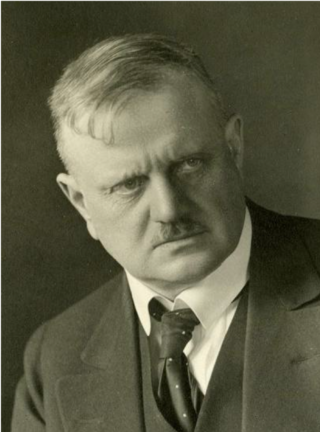
The Oceanides, Op. 73, is a single-movement tone poem for orchestra written from 1913 to 1914 by the Finnish composer Jean Sibelius. The piece, which refers to the nymphs in Greek mythology who inhabited the Mediterranean Sea, premiered on 4 June 1914 at the Norfolk Music Festival in Connecticut with Sibelius conducting. Praised upon its premiere as "the finest evocation of the sea ... ever ... produced in music", the tone poem, in D major, consists of two subjects, said to represent the playful activity of the nymphs and the majesty of the ocean, respectively. Sibelius gradually develops this material over three informal stages: first, a placid ocean; second, a gathering storm; and third, a thunderous wave-crash climax. As the tempest subsides, a final chord sounds, symbolizing the mighty power and limitless expanse of the sea.
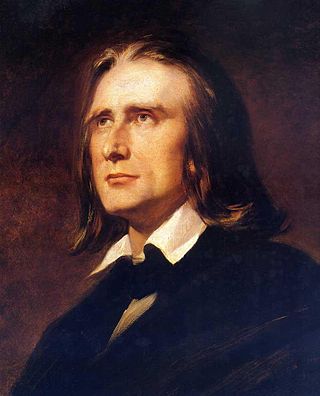
Les préludes, S.97, is the third of Franz Liszt's thirteen symphonic poems. The music was composed between 1845 and 1854, and began as an overture to Liszt's choral cycle Les quatre élémens, then revised as a stand-alone concert overture, with a new title referring to a poem by Alphonse de Lamartine. Its premiere was on 23 February 1854, conducted by Liszt himself. The score was published in 1856 by Breitkopf & Härtel. Les préludes is the earliest example of an orchestral work entitled "Symphonic Poem".

The Voice of the Ancient Bard is a poem written by the English poet William Blake. It was published as part of his collection Songs of Innocence in 1789, but later moved to Songs of Experience, the second part of the larger collection Songs of Innocence and of Experience, 1794.

The Wood Nymph, Op. 15, is a programmatic tone poem for orchestra composed in 1894 and 1895 by the Finnish composer Jean Sibelius. The ballade, which premiered on 17 April 1895 in Helsinki, Finland, with Sibelius conducting, follows the Swedish writer Viktor Rydberg's 1882 poem of the same title, in which a young man, Björn, wanders into the forest and is seduced and driven to despair by a skogsrå, or wood nymph. Organizationally, the tone poem consists of four informal sections, each of which corresponds to one of the poem's four stanzas and evokes the mood of a particular episode: first, heroic vigor; second, frenetic activity; third, sensual love; and fourth, inconsolable grief.













